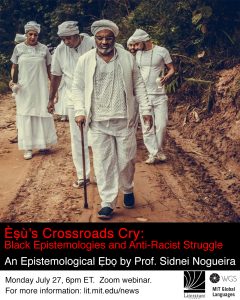Join us for a lecture and conversation with Sidnei Nogueira, a leading Black queer scholar, activist, and community leader in Brazil. Prof. Nogueira’s epistemological ẹbọ—an epistemological offering—will propose extending systems of thought that affirm Black thought and lives within Afro-Brazilian religious communities to hegemonic white spaces such as academia. Free and open to everyone.
Èṣù’s Crossroads Cry: Black Epistemologies and Anti-Racist Struggle

Add to your calendar Sponsored by Literature @ MIT, Women’s and Gender Studies, and Global Languages Event Description: Within the realm of knowledge, colonialism has given rise to an enduring process that reproduces economic, political, and cognitive logics of existence; human relationships with nature; and ways of being and doing in the world, all forged within the context of transatlantic enslavement.[1] Thus, although we might admire the world’s complex multicultural mosaic, throughout modernity a single epistemological model has configured the production of knowledge as if the world were instead monocultural. This single model has decontextualized knowledge considered non-hegemonic and prevented the emergence of other forms of knowledge that do not conform to its paradigm. As a result, an epistemicide has unfolded, that is, the destruction of some forms of local knowledge and the inferiorization of others, wasting, in the name of colonialism’s grand designs, the wealth of perspectives inherent in cultural diversity along with the multifaceted visions of the world they enact.[2] By fashioning the structures of modern thought from this destruction, epistemicide has acted as a tentacle of racism. Epistemicide suffocates non-hegemonic modes of existence we might term “polysemic-Exuistic,” after the Yorùbá divinity of movement, possibilities, and transmutation, the one who is a collective and the collective which is one. At the crossroad’s center—locus of entrances and exits, of multiple choices and re-choosings, convergences and divergences, possibilities—the lord of contradiction, Èṣù turns and issues his strident decolonial cry, calling for a world-sense focused on poly-existences as an alternative to worldviews stranded in the singular self.[3] Our terreiro dialogue will take this crossroad as its starting point.[4] The event aims to bring into the fold, into the roda, forms of knowledge strategically situated at the outskirts of Western culture and history: plural Black poetics and belief systems.[5] Anti-racist struggle and the healing of a sick social body must begin by listening attentively to Èṣù’s cry. Following his lead, we must develop and experience an epistemology of nooks and corners and back alleys, one which might even the re-potentiate the Yoruba “Mo wà” – I exist. As part of the current decolonial turn in Afro-Brazilian religions, our conversation intends to (re-)circulate the forms of Black knowledge present inside traditional terreiro communities and other Afro-Atlantic religious traditions as a way of literally returning us to our senses. By taking up the interpretation of the Ifá, the jogo de buzios, and the terreiro’s other textual genres as forms of struggle against epistemicide, we restore the civilizing values preserved within these texts and communities to their full semantic force so that they might extrapolate into praxis and “therapeutically” strengthen bodies intentionally rendered sick by our current moment’s racism and dogmatism. This form of Exuneutics, a portmanteau of Èṣù and hermeneutics, not only allows terreiro knowledge to circulate in new spaces, but it also challenges hegemonic institutions such as academia to the rethink the ways in which they produce, value, and disseminate knowledge. Prof. Sidnei Nogueira received his PhD in Semiotics and General Linguistics from the University of São Paulo (USP). He was a fellow at the French National Centre for Scientific Research (CNRS-Paris), conducting research on the ways in which traditional Afro-Brazilian religious communities retained the tonality of Yoruba through the use of melodic pitch in their chanting and texts. He has published the books Coisas do Povo do Santo and Intolerancia Religiosa. Currently, he is coordinator and faculty member of Ilê Ará (Instituto Livre de Estudos Avançados nas Religiões Afro-brasileras) as well as leader of the CCRIAS terreiro (Comunidade da Compreensão e da Restauração: Ilé Asé Sàngó).
[1] Within the large body of theory and scholarship on colonial structures of thought, see Sylvia Wynter’s “Unsettling the Coloniality of Being/Power/Truth/Freedom: Towards the Human, after Man, Its Overrepresentation–An Argument” (2003), Grada Kilomba’s Plantation Memories: Episodes of Everyday Racism, and Luiz Rufino’s Pedagogia das Encruzilhadas (2019). [2] The term “epistemicide” was first coined by Portuguese sociologist Boaventura Sousa Santos. Brazilian philosopher and activist Sueli Carneiro developed the concept to address the systematic destruction of Black thought and culture that accompanies genocidal practices such as police killings and mass incarceration. [3] In The Invention of Women: Making an African Sense of Western Gender Discourses (1997), Nigerian theorist Oyèrónké Oyěwùmí proposes “world-sense” as an alternative to the Western concept of worldview and its privileging of the visual. [4] Terreiros are Afro-Brazilian communities which have preserved and nurtured Black knowledge, philosophy and beliefs since the 17th century. [5] The roda is the circular formation present in the most prominent forms of Afro-Brazilian knowledge preservation, production, and transmission, such as candomblé, capoeira, and samba. In the roda, members of the community all face each other.
